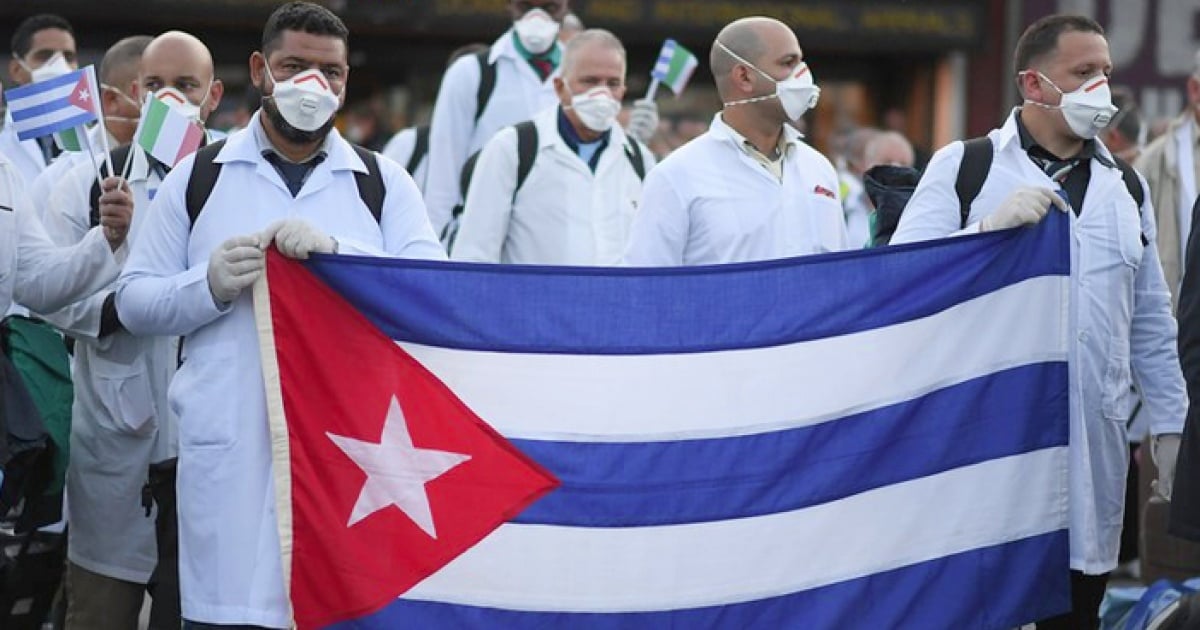
Related videos:
The United States government announced on Tuesday the expansion of its visa restriction policy, this time targeting Cuban officials and those from other countries involved in the island's labor export program, particularly medical missions abroad.
"United States is expanding its visa restriction policy related to Cuba. @StateDept has taken steps to limit the issuance of visas to Cuban government officials and officials from complicit third countries, as well as to individuals responsible for Cuba's exploitative labor export program," wrote Marco Rubio on X.
"We will promote accountability for the Cuban regime for oppressing its people and for those who benefit from forced labor," he added.
The statement released specifies that the measure will focus on "current or former officials of the Cuban government and other individuals, including officials of foreign governments, who are believed to be responsible for or involved in the program of exporting Cuban labor."
In particular, it focuses on Cuban medical missions abroad, which, according to the statement, are a mechanism for the exploitation of Cuban workers.
The sanction will also affect the immediate family members of those involved.
Rubio confirmed that "the Department has already taken steps to impose visa restrictions on several individuals, including Venezuelans, under this expanded policy."
The statement emphasizes that "Cuba continues to benefit from the forced labor of its workers," and that the regime's abusive and coercive labor practices are well documented.
Rubio argued that these programs not only enrich the regime, but also "deprive ordinary Cubans of the healthcare they desperately need in their home country."
"The United States is committed to countering forced labor practices worldwide," concluded the Secretary of State.
The return of Trump to the White House
Since January 20, the Trump Administration has implemented a series of measures that have affected the relations between the United States and Cuba, as well as the immigration situation of Cubans.
On January 20, 2025, on his first day in office, the president revoked the decision of his predecessor, Joe Biden, to remove Cuba from the list of state sponsors of terrorism.
In addition to the reincorporation of Cuba into the list of state sponsors of terrorism, the Trump administration has intensified economic sanctions against Cuba.
These measures include additional restrictions on trade and finance, aimed at pressuring the Cuban government. As a result, companies like Western Union have suspended their operations on the island, affecting the sending of remittances.
Trump signed executive orders that eliminate the humanitarian parole program, which allowed the legal entry and temporary stay of migrants from countries such as Cuba, Haiti, Nicaragua, and Venezuela.
Furthermore, the CBP One application has been deactivated, a tool used to manage asylum requests and other immigration processes. These actions have left thousands of migrants in a legal limbo, creating uncertainty about their status in the United States.
The latest blow to Cuban immigrants has been the "administrative pause" on the immigration processes of hundreds of thousands of beneficiaries of programs such as humanitarian parole and family reunification.
This suspension, justified by concerns about fraud and security, affects those who were hoping to regularize their immigration status, leaving them in a state of uncertainty regarding their future in the United States.
Frequently Asked Questions about the Expansion of the U.S. Visa Restriction Policy towards Cuba
Why is the United States expanding visa restrictions on Cuban officials?
The United States has expanded visa restrictions on Cuban officials as part of its policy to hold the Cuban regime accountable for the exploitation of its workers in international medical missions and other labor initiatives that it deems exploitative. This measure is part of actions aimed at pressuring the Cuban government and demanding accountability for its abusive labor practices.
Who will be affected by the new visa restrictions towards Cuba?
The new visa restrictions will apply to current or former officials of the Cuban government, as well as individuals from third countries who are believed to be responsible for or involved in the Cuban labor export program. They will also affect the immediate family members of those involved in these activities.
How has the Cuban regime responded to recent actions by the United States?
The Cuban regime has criticized the actions of the United States, labeling them as hostile and asserting that they demonstrate the brutality with which the U.S. handles the migration crisis. The Cuban government has rejected the decision to use the Guantanamo Naval Base as a detention center for migrants, warning of possible "serious consequences."
What other measures has the Trump administration taken against the Cuban government?
In addition to visa restrictions, the Trump administration has re-added Cuba to the list of state sponsors of terrorism, reinstated the "Restricted List of Cuba," and imposed sanctions on companies such as Orbit S.A. These actions aim to cut off the funding sources of the Cuban regime and isolate it internationally, directly impacting its economy and repressive capacity.
Filed under: